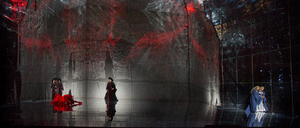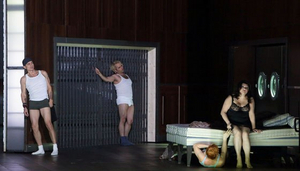Preview/Interview: To FRAU or Not to FRAU in 2021? Stemme's the Met's Dyer's Wife, with Some Words from Birgit Nilsson
Some people dream of a White Christmas--or at least an end to the horrors of COVID-19 and a semblance of life returned to normal, with medical science saving as many lives as possible. I'll drink to that.

Wernicke. Photo: Ken Howard/The Met
But high on my list of events I'm hoping to hear in a world turned back on its feet is the return of Richard Strauss's DIE FRAU OHNE SCHATTEN, the anti-fairy tale, which I began thinking about when I was reading Parterre Box the other day--that blog for opera queens, operaphiles and anyone with an ounce of opera flowing through their veins.
Klaus Florian Vogt and Elza van den Heever are scheduled as the Emperor and Empress (she, the woman without a shadow, i.e., unable to have children), Evelyn Herlitzius the evil, quietly vicious Nurse, and Michael Volle and Nina Stemme as the Dyer, Barak, and his spouse, known only as "the Dyer's Wife."
When last seen at the Met, in 2013, the Dyer's Wife was sung by Christine Goerke, and it relaunched her career, as a dramatic soprano to be reckoned with, in a seemingly effortless performance.
It will be interesting to hear what Stemme brings to the part; having heard her in TRISTAN UND ISOLDE, ELEKTRA and TURANDOT, I know that her voice is big, but with soft edges that help to humanize the sometimes-harsh characters she sings. Indeed, the Dyer's Wife is very human, but with the outsize character to keep the men in her life at bay, which is why she is frequently sung by the sturdiest of big, Wagnerian voices.
I interviewed the queen of the "stainless steel" Wagnerian sopranos, the inimitable Birgit Nilsson, just before she made her US debut as the Dyer's Wife in San Francisco, back in 1981 for the opening's program. I taped our conversation, over lunch in Malmo, Sweden, and her big personality and quick wit were in rare form. All these years later, it seems like yesterday.
.png) The role already "belonged" to her in Europe, since her 1975 debut performance in the Strauss opera in Stockholm. Still, the Met--which had offered her the role in its opening week production at Lincoln Center--showed no interest in bringing her back with it, until after her triumph in San Francisco. Then, they cancelled another opera on the schedule and inserted FRAU, with Nilsson. (Her manager wanted her to be the Empress, the more glamorous leading role, for the opening; Leonie Rysanek, however, had already been cast.)
The role already "belonged" to her in Europe, since her 1975 debut performance in the Strauss opera in Stockholm. Still, the Met--which had offered her the role in its opening week production at Lincoln Center--showed no interest in bringing her back with it, until after her triumph in San Francisco. Then, they cancelled another opera on the schedule and inserted FRAU, with Nilsson. (Her manager wanted her to be the Empress, the more glamorous leading role, for the opening; Leonie Rysanek, however, had already been cast.)
But, Nilsson told me, it was a role she almost didn't take. After attempting to learn it, score in hand, at her farm in Sweden, squeezing it in without cancelling anything else on her docket, she found she couldn't place it in her voice. "It was extremely hard for me to learn--even more than ELEKTRA--in the tonal work," she told me.
And though she believed that most singers start with the character and then learn the music, "...for me, the music comes first. I start to learn it like a dummy-dummy and then, finally, as the words [by Hugo von Hofmannsthal] get deeper and deeper in me, I develop the character,' she explained. "The music may not seem very hard, but my voice became very tired and I thought I could not do it."
Even after long hours working with a coach, things were not getting easier--straining her voice and hurting her throat--and were affecting other performances on her agenda. She made a hard decision: to cancel, because she was "absolutely sure" she couldn't sing it.
She arrived in Stockholm to see the general manager and back out of the engagement. But before she could say a word, he told her catastrophic news: the Barak had just cancelled. She recalled the GM saying, "Can you imagine, he has the nerve to cancel just a month before the opening!...I am going out of my mind!" When she heard this, she lost the nerve to cancel herself. "I was chicken, you know!?"
Instead of returning home, she stayed in Stockholm to rehearse with the orchestra and, voila!, the problems she'd been suffering disappeared, though she couldn't quite understand why. She laid part of the blame for her difficulties on Strauss himself; when he was casting the premiere at the Vienna State Opera, he sent it to the leading soprano, Lotte Lehman--and she sent it back to him, saying she couldn't do it. Nilsson explained to me that Lehman said that she believed that even Strauss knew no one would sing it as it had been written.
The Dyer's Wife was the closest that Nilsson had ever come to cancelling a role, she told me. And it was the last new role she ever did. But if she had actually given up on it, "I would have told the truth--not like Jon Vickers who, cancelling TANNHAUSER, said he couldn't do it because it was against his religion," throwing her head back in a laugh.

Photo: Bayerische Staatsoper
I recently listened to one of the recordings of the opera that are available on the Roku YouTube channel, a performance from the Bayerische Staatsoper in Munich. Though sung well, garish would be a mild description of the modern production. Barak's dying vats looked like a row of washing machines and the Dyer's Wife was decked out in slutty costumes that probably would have sent Nilsson running for her life from the Met.
But make no mistake, DIE FRAU OHNE SCHATTEN is a marvelous opera that only a fool would pass up the chance to hear, no matter what the production looked like. Stay tuned for further news on COVID-19, and how it affects all of mankind--not to mention the coming season at the Met.
Videos
.png)
